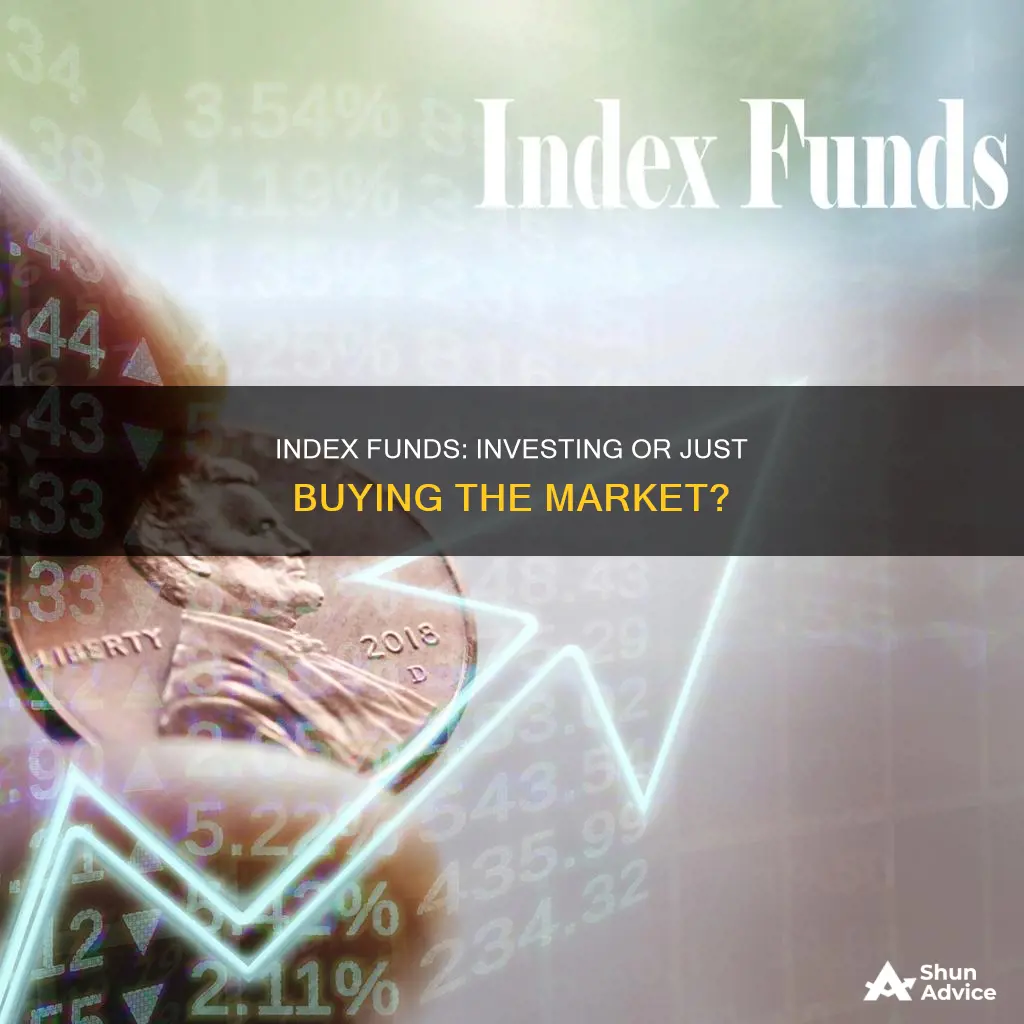
Index funds are a type of mutual fund or exchange-traded fund (ETF) that tracks the performance of a market index, such as the S&P 500. They are a passive investment strategy, meaning they aim to replicate the performance of a specific index rather than actively selecting stocks. This makes them a low-cost investment option with broad diversification across various sectors and asset classes. Index funds are suitable for investors seeking a simple, long-term investment strategy without the need for active management.
| Characteristics | Values |
|---|---|
| Type of fund | Mutual fund or exchange-traded fund (ETF) |
| Aim | To mirror the performance of an index |
| Investment | A group of stocks or bonds |
| Management | Passive |
| Risk | Lower than individual stocks |
| Returns | Average market returns |
| Costs | Low fees |
| Taxes | Tax-efficient |
| Research | Minimal |
| Control | No control over the investments |
What You'll Learn

Index funds are a passive investment strategy
Index funds are long-term investment strategies that aim to reduce costs by minimising the buying and selling of securities. They are considered passive because they do not involve actively picking securities or timing the market. Instead, investors purchase securities in a representative benchmark and hold them for a long time. This strategy is called "buy-and-hold", and it aims to build wealth gradually by avoiding the costs associated with frequent trading.
Index funds are a popular choice for investors seeking low-cost, diversified, and passive investments that can outperform higher-fee, actively traded funds. They are ideal for long-term investing, such as retirement accounts. Index funds are also well-suited for beginners stepping into the investment world because they are a simple, cost-effective way to hold a broad range of stocks or bonds.
The benefits of index funds include lower fees, market representation, transparency, historical performance, and tax efficiency. Index funds typically have lower expense ratios because they are passively managed. They offer broad market exposure and diversification across various sectors and asset classes. The holdings of an index fund are well-known and available on investing platforms, making them transparent. Over the long term, index funds have often outperformed actively managed funds, especially after accounting for fees and expenses. Finally, index funds are tax-efficient because they generate lower taxable income and have lower turnover rates, resulting in fewer capital gains distributions.
Despite their benefits, index funds also have some drawbacks. One criticism is their lack of flexibility. Index funds are designed to mirror a specific market, so they decline in value when the market does, and they cannot pivot away when the market shifts. Additionally, index funds automatically include all the securities in an index, which may include overvalued or weak companies. Another disadvantage is market-cap weighting, where companies with higher market capitalisations have a more significant influence on the fund's performance, magnifying the risks if these companies underperform.
Debt Funds: SIP or Lumpsum?
You may want to see also

They are a low-cost investment option
Index funds are a low-cost investment option. They are passively managed, meaning they are designed to replicate the performance of a specific market index, such as the S&P 500 or the Nasdaq Composite. This passive management strategy means that index funds have lower fees than actively managed funds, as they do not require a team of analysts and portfolio managers to decide which investments to buy or sell.
Index funds have lower expense ratios, which are the ongoing fees paid to the fund manager. For example, the average stock index mutual fund charges an expense ratio of 0.05%, or $5 for every $10,000 invested, while an actively managed mutual fund might have an expense ratio of 1% or more. Index funds also tend to have lower transaction costs, as they trade less frequently than actively managed funds.
In addition to lower fees, index funds can also offer investors tax advantages. Because they buy and sell holdings less often, index funds generate less taxable income, resulting in lower capital gains taxes for investors. This makes them a more tax-efficient investment option.
The low-cost nature of index funds makes them an attractive option for investors, particularly those who are just starting out or who are looking for a simple, low-maintenance investment strategy. By investing in an index fund, investors can gain exposure to a diversified portfolio of stocks or bonds at a low cost, making it a more accessible way to invest.
When considering an index fund, it is important to compare the fees and performance of different funds, as well as the specific index being tracked. While index funds are generally a low-cost option, some funds may have higher expense ratios or investment minimums, so it is important to carefully review the fund's prospectus or offering documents before investing.
Fidelity Investments: Where Are Shareholder Funds Held?
You may want to see also

They are highly diversified
Index funds are highly diversified because they are designed to track the performance of a financial market index, such as the S&P 500, and contain a broad range of stocks across various sectors. This means that if you invest in an index fund, you will be exposed to all the stocks in that index. For example, the S&P 500 index fund holds stocks from about 80% of all U.S. equities by market cap. This broad diversification offers several benefits to investors.
Firstly, it provides a simple, no-fuss way to gain exposure to a wide variety of stocks and build a diversified portfolio at a low cost. Index funds are passively managed and have low expense ratios, making them an attractive option for investors looking for a straightforward and cost-effective way to invest in a group of stocks.
Secondly, diversification helps to lower the overall risk of investing. While the price of any individual stock in the index may drop steeply, its impact on the overall index fund will be minimal if it is a relatively small part of the index. This inherent diversification in index funds means that even if a single company performs poorly, it will not significantly affect the fund's performance.
Additionally, index funds offer broad market exposure and provide investors with immediate diversification. With just one purchase of an index fund, investors can own hundreds of stocks across different sectors, reducing the volatility and risk associated with investing in individual stocks.
Furthermore, index funds have the advantage of being highly diversified while maintaining low costs. Because index funds are passively managed, they do not require a team of analysts and portfolio managers, resulting in lower management fees compared to actively managed funds. The automated strategy of index funds, which involves replicating the performance of a specific market index, helps keep costs low for investors.
Lastly, index funds provide an opportunity for long-term growth by mirroring the performance of the financial market indexes they track. Over time, the market tends to rise, and index funds aim to capture these long-term solid returns.
In summary, index funds are highly diversified because they track financial market indexes and hold a broad range of stocks. This diversification offers benefits such as low costs, reduced risk, broad market exposure, and the potential for long-term growth, making them a popular choice for investors seeking a simple and effective investment strategy.
Best Mutual Funds for Tax Savings: Where to Invest?
You may want to see also

They are easy to invest in
Index funds are easy to invest in. They are a great investment for building wealth over the long term and are popular with retirement investors. Here are some reasons why they are easy to invest in:
- Low costs: One of the biggest selling points of index funds is their low cost. They are cheap to run because they are automated to follow the shifts in value in an index. Low costs are good for investors because they mean higher returns.
- Diversification: Index funds are diversified because they track a particular market index, such as the S&P 500, which means they contain a broad range of stocks across various sectors. This diversification reduces the risk of losing money.
- Simplicity: Index funds are simple to invest in because they don't require active management. They are passively managed, meaning they don't require a fund manager to actively decide which investments to buy or sell. This passive management strategy also means lower fees.
- Accessibility: Index funds are accessible to regular investors. They can be purchased directly from a mutual fund company or a brokerage, or on public markets. They also tend to have low account minimums or no minimum investment required.
- Performance: Index funds have consistently outperformed other types of funds in terms of total return. Over the long term, they have generally outperformed other types of mutual funds.
- Tax efficiency: Index funds are tax-efficient compared to many other investments. They generate less taxable income and tend to have lower transaction costs.
Oil Fund Investment: A Guide to Getting Started
You may want to see also

They have low fees and good tax advantages
Index funds are a type of mutual or exchange-traded fund (ETF) that tracks the performance of a market index, such as the S&P 500, by holding the same stocks or bonds or a representative sample of them. They are defined as passive investments that mirror the performance of benchmarks like the S&P 500 by mimicking their makeup.
Index funds have lower fees than actively managed funds. They are passively managed, meaning they don't require research analysts and others to choose stocks or time trades. This results in lower operating expenses, fewer transaction fees, and lower commissions. Index funds can have expense ratios as low as 0.04%, compared to 0.44% or more for actively managed funds.
Index funds also have good tax advantages. They generate less taxable income because they trade holdings less frequently. They also have more control over capital gains distributions because they can choose which lots to sell, allowing them to sell the ones with the lowest capital gains and the lowest tax bite.
Short-Term Investment Strategies: Where to Park Your Money
You may want to see also
Frequently asked questions
Index funds are a low-cost, easy way to build wealth. They are passively managed, which means they don't need to actively decide which investments to buy or sell. Index funds are often used to help balance the risk in an investor's portfolio, as market swings tend to be less volatile across an index compared with individual stocks. They are also more tax-efficient than other investments as they generate less taxable income.
Index funds are designed to mirror a specific market, so they decline in value when the market does, and they can't pivot away when the market shifts. They are also criticised for automatically including all the securities in an index, which means they may invest in overvalued or weak companies.
You can purchase an index fund directly from a mutual fund company or a brokerage. You'll need to open an investment account, such as a brokerage account, individual retirement account (IRA) or Roth IRA. Then you can buy the fund in the account.







